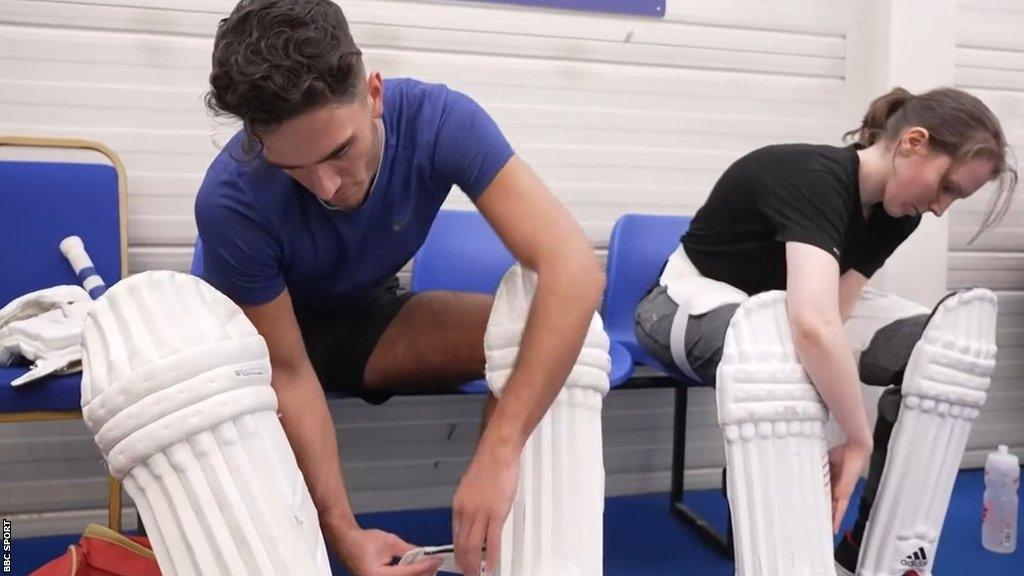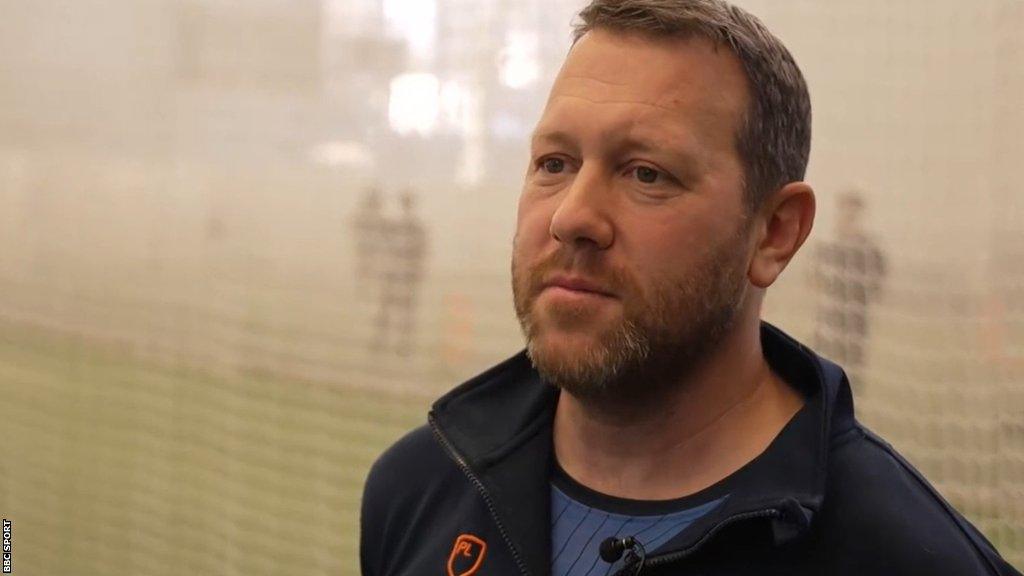LGBT+ History Month: Meet the clubs working to make English cricket a game for everyone
- Published
LGBT+ History Month: Birmingham Unicorns and Warwickshire CCC promote allyship
It's little wonder Liam Norwell is smiling.
If there's one thing the Warwickshire pace bowler can appreciate, it's a good delivery - and as another neon-orange stump gets flattened at the club's indoor training centre, it's clear he likes what he's seeing.
"A couple of the guys I've just been in the nets with are pretty handy bowlers," he says with a grin.
"There's some really good cricket to watch here."
If Norwell sounds surprised, it's because this isn't your average training session.
Go back a couple of years and some of the people involved wouldn't have even known how to hold a cricket ball, let alone be able to send it thundering down the wicket in the nets at Edgbaston.
Strange as it seems, in a sport known for its ducks, it's taken a unicorn to get these players into the game.
'It's a safe space… there are no barriers here!'
Confused? Let me explain.
Yes, the 'unicorns' line is a bad pun - but it happens to be true.
The players being put through their paces here are all members of the Birmingham Unicorns, external - a club founded in 2020 as a place where LGBTQ+ people can play cricket without having to hide who they are.
Some of them have experienced discrimination in their day-to-day lives, and others have wondered whether their sexuality or gender identity would prevent them from being welcomed in cricket at all.
The Unicorns set out to change that, and they have partnered up with Warwickshire to try to open the game up to everyone.
A Unicorns member is on the Warwickshire board, and the County Championship team puts on training sessions like this one to help Unicorns players get to grips with the intricacies of the game.
"My wife and I were kind of bored and wanted to join a club," Olivia - one of the Unicorns - says between deliveries.
"I'd watched games on TV but hadn't really played it, and this seemed like a really good opportunity.
"Everyone should be able to compete as they are, and in a mixed-team sport like this it's really good to get involved.
"The Unicorns provide a safe little space. There's no barriers here!"
'The allyship is huge, especially in cricket, where we've lagged behind'

The Birmingham Unicorns have teamed up with Warwickshire to open up cricket to more people
The club was founded by Lachlan Smith, who still serves as its chair. Were it not for an injury picked up in winter training, he would probably be having a bowl himself.
Instead, he's wrangling his squad into groups from the sideline, and watching as the Warwickshire coaches dole out the advice.
"They've been so supportive and encouraging, and the little skills and tips you pick up really stay with you," he says.
"Our partnership with Warwickshire has developed over the years, and they've been incredibly supportive of what we want to do. That allyship is huge, especially in cricket - because I think we've lagged behind a little bit.
"So to have world-famous cricket clubs like Warwickshire being allies to clubs like ours… I mean, people have taken time off work to be part of this!"
'I've been in environments that could have put me off'

Paul Greetham has been Warwickshire's high performance manager since 2014
Smith isn't wrong about that lag.
For all the talk about the number of gay men playing professional football, it's often forgotten that only one male professional cricketer - Somerset's Steven Davies - has ever felt comfortable enough to speak publicly about their sexuality.
For years, the world's only LGBTQ+ cricket club was London-based Grace's, and it took the formation of the Unicorns for cricket to reach a stage where two inclusive teams could actually play a match against each other.
Yes, clubs are beginning to embrace things like Pride Games and LGBTQ+ supporters groups, but clearly, there's still work to do.
Paul Greetham is Warwickshire's high performance manager, and one of just a handful of out men working in the professional game.
"As a gay man, there were several moments where I've been part of environments that could have put me off," he says.
"An unnecessary team ethos, or things said in the dressing room - but I was true to the game and wanted to play cricket. So what the Unicorns have done to send that inclusive message out there has been fantastic! It'll encourage people to be their authentic self in clubs, and hopefully in the professional game as well."
'You hope that's cricket, full-stop'
The session ends with a treat for the Unicorns.
With the February frost still catching the light on the Edgbaston outfield, they're given the chance to step on to the pitch to grab some photographs.
There's something poetic about it all - one of cricket's newest clubs, made up of LGBTQ+ players and allies, walking out at one of the game's oldest grounds.
Yet there's also an awareness that too many LGBTQ+ people haven't had the chance to do this in the past, simply because of who they are.
"There's probably a lot of talent in all sports that have missed out because of not feeling included," Norwell admits.
"As a squad, we're making a big effort to make everyone feel like they do belong. Anything we can do to bring inclusivity to the sport, it's our job to do that."
It's a message that Warwickshire head coach Mark Robinson echoes wholeheartedly.
"I had the pleasure of being with the England women's team and saw some of them become more open and less vulnerable about their sexuality," he says.
"Maybe at some point, it'll be the same in the men's world as well.
"My involvement in cricket has been wonderful and supportive, and you just want everyone to have the same experience, the same options, the same support that I got as well.
"You hope that's cricket, full-stop."
You can hear new episodes of the BBC's LGBT Sport Podcast with Jack Murley every Wednesday on BBC Sounds.